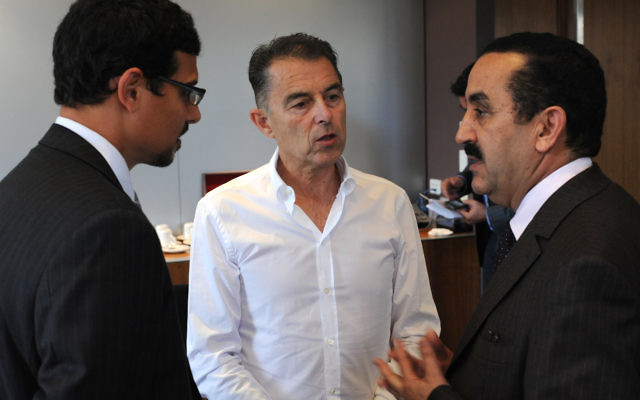Moroccan ambassador looks to mend broken ties
ISRAEL/Morocco relations appear to be at a low ebb due to a series of international incidents, including the forced evacuation of an Israeli diplomat from the North African country’s capital Rabat, and the murder of a Jewish businessman in Casablanca.
ISRAEL/Morocco relations appear to be at a low ebb due to a series of international incidents, including the forced evacuation of an Israeli diplomat from the North African country’s capital Rabat, and the murder of a Jewish businessman in Casablanca.
But according to Morocco’s Ambassador to Australia Mohamad Mael-Ainin, Morocco remains a staunch friend of Israel and the Jewish people.
“There is a deep-rooted recognition and belief in the true contribution of the Jewish community and heritage in the fabric of our modern and tolerant Moroccan society,” the ambassador said at an event jointly hosted by the Capital Jewish Forum (CJF) and Jews of the Melbourne CBD (JBD), at the offices of law firm Cornwall Stodart.
In March, Israeli delegate to the European Parliament David Saranga was forced to flee Morocco after tens of thousands of people took to the streets, burning Israeli flags in protest against his involvement in a conference of European and Mediterranean countries at Morocco’s parliament.
Saranga was asked to leave the conference and had to be escorted from the building by security forces for his protection.
Mael-Ainin insisted Saranga’s removal was not motivated by the protests.
“The meeting was for [European] Parliamentary members, and he wasn’t a member for the Parliament … there was no place for any diplomat, and for that he was asked to leave the place, it was due to his status,” he said.
Mael-Ainin further argued the property dispute that saw a Jewish landowner bludgeoned to death by a Muslim tenant was not indicative of a pervading anti-Semitic sentiment.
“It was a simple act between two citizens of the same country, and it was based on an issue of discordance about the rent of the house … it is very sad but it has no religious or political background,” he said.
While Morocco has no diplomatic relations with Israel, Moroccan residents are permitted to celebrate Israel’s Independence Day, maintain their residency should they emigrate to Israel, and Israelis can freely enter the country, the ambassador said.
“The celebration day [Independence Day] is a form of recognition between states,” he said.
According to the ambassador, Moroccan policy on the Israeli-Palestinian conflict is to promote peaceful negotiations, while remaining committed to the “historical rights for Palestinian independence”.
“We support the wellbeing of the Jewish community in Morocco, as well as the peace process in the Middle East.”
The ambassador was keen to highlight the coexistence and tolerance between Muslims and Jews throughout Moroccan history, dating back to Jewish immigration to the country more than two millennia ago.
“With their skill in commerce, arts, and handicrafts, and with their wealth, the Jews have contributed positively to the rise and development of Morocco.
“Jewish Moroccan citizens continue to play a notable role in Morocco. They are well represented in business, politics and culture. Jewish schools and synagogues receive government subsidies,” he said.
There are currently around 4000 Jews still living in Morocco, mainly in Fez, Casablanca and Essaouira, and one of King Mohammed’s key advisers, Andre Azoulay, is Jewish.
TIMNA JACKS


comments